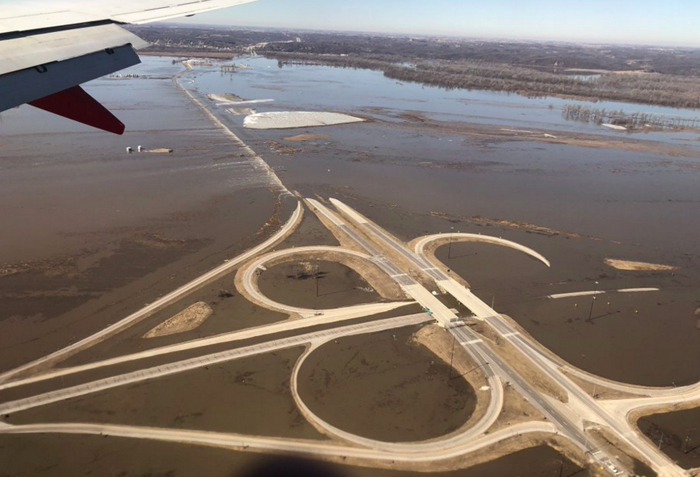An omen: big reinsurers are voting with their chequebooks

In the land of Big Money, Legal and General is about as Establishment as it gets. This venerable British institution, which began life in 1836 offering life assurance for London lawyers, is now among the top 10 global investors, and Europe’s second-biggest.
Last month, L&G’s investment management arm, LGIM, announced that it was dumping shares in five giant companies it has determined are not doing enough to address climate change: ExxonMobil, insurer Metlife, Hormel Foods (maker of Spam), US retailer Kroger and the Korean Electric Power Corporation.
They were added to a long list of companies L&G had previously judged to be laggards, including Subaru, Russian oil giant Rosneft, China Construction Bank and Japan Post Holdings.
In divesting $5 billion worth of shares, LGIM has publicly named and shamed the companies concerned, which it believes are failing to address what it calls the “climate emergency”, something it believes has potentially “drastic consequences” for markets, companies and clients’ assets.
Throughout its existence the core business of L&G has been life and general insurance, but in 2014, in a sign that the company was taking special note of climate change and the disruption it causes, it launched a reinsurance company.
Reinsurance is risk management, writ large. In covering insurance companies against claims that could otherwise bankrupt them, reinsurers identify major risks and put a price on them, and when disaster strikes they seek to spread the cost burden through mutualised global arrangements.
As an insurer L&G didn’t need much outside advice about large-scale risk: financial crashes, loss of life, limb and property, mining and transportation disasters and such like. But the leading reinsurance companies are the best guide to where most future risk lies. Follow the money, as the betting market would put it, and the biggest money is on climate change.
The world’s biggest reinsurer, Germany’s Munich Re, has been tracking climate change risk for more than 40 years, and has widely publicised its resolve to get authorities to act on climate change.
Munich Re has put a lot of effort into attribution of climate risk – identifying the extent to which any given weather event is made more likely by climate change – with the aim of getting governments to implement long-term adaptation measures.
Swiss Re, number two in the global pecking order, is equally concerned about climate risk, warning that its “risk landscape” is already shaken up by the effects of climate change – higher temperature, rising sea level, melting ice, more heatwaves and erratic rainfall patterns.
Two other big players, London-based Lloyd’s and the French company SCOR SE, which is underwriting major renewable energy developments, expect climate losses to continue to grow. Lloyd’s has identified tropical windstorms and flooding as the biggest global reinsurance risks.
One company among the top global reinsurers takes a different view. This is Warren Buffett’s giant US conglomerate Berkshire Hathaway, whose 70-odd reinsurance companies add up to the third biggest reinsurance enterprise in the world, behind only Munich Re and Swiss Re.
The flexibility afforded by Berkshire Hathaway’s huge array of business activities – financial and insurance, food, drink, furniture, clothing and jewellery manufacturing, retail, railways, airlines, home appliances, newspapers and energy, among others – offers a shield of sorts in the event of massive reinsurance losses.
Buffett, known as one of the world’s shrewdest investors, felt confident enough to write in one of his company newsletters that “the chance of any event causing Berkshire to experience financial problems is essentially zero. We will always be prepared for the thousand-year flood; in fact, if it occurs we will be selling life jackets to the unprepared.”
Buffett accepts that “we have one planet, and we ought to pay a lot of attention to what’s going on.” He told physicist James Hansen at a 2016 shareholders’ meeting that “climate change is an incredibly important subject”.
But he added that it would not hurt his insurance business and was immaterial compared to other influences. He has said that financial crashes like that in 2008 are a much bigger threat than climate.
His European counterparts beg to differ. Having invested time and capital to understand risks attached to high carbon emissions, they fear the potential for cascading climate events, piled one on top of another, to put unprecedented pressure on economic, legal and administrative systems.
Devastating Texas floods and California wildfires in recent years, and the record-breaking rain and flooding in and around Buffett’s home state of Nebraska last March, were big financial blows to his company. The 88-year-old may yet be persuaded to reconsider his position.
Eventually Berkshire Hathaway will join the rest of the big reinsurers. As the irresistible climate freight train makes its presence felt everywhere, money for new fossil fuel enterprises, including coal mining and power generation, is going the way of Darling River water.
